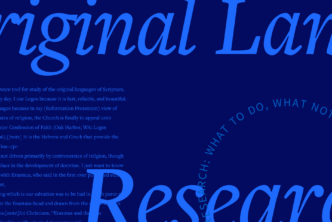Sometimes readers of Scripture are encouraged to “read the Bible like any other book.” This suggestion can arise from a desire to read the Bible as literature—that is, to read books of the Bible according to the rules of their respective genres. For example, it makes sense to read the historical books as narratives that recount true events and the epistles as letters written to churches in a first-century context.
But if reading the Bible as literature is reduced simply to reading the Bible like any other book, we run into a problem. Prior to the seventeenth century, the Bible was typically viewed as a supernatural book, one that bore the marks of God’s inspiration. When thinkers like Benedict de Spinoza (1632–1677) came on the scene, they held that people would be better served if they read the Bible as they read any other historical document, subjecting it to the same critical eye that we use on merely human writings. In doing so, this phrase undermined the Bible as supernatural.
Historical criticism
Interestingly, many of those who spearheaded this new “critical” approach to the Bible believed they were defending and upholding the Bible’s value for readers. So a figure like John Locke (1632–1704) encouraged people to focus not on the divine author’s but on the human authors’ intended meaning; Locke thought this approach would acknowledge the value of the new critical methods while upholding biblical authority. The field of study that emerged from such thinking was called historical criticism.
Such well-meaning efforts had some positive effects. It encouraged readers to see the Bible in its historical context, to recognize how it is grounded in human life, and to attend to the details of the biblical text. It sent people searching for ancient artifacts corroborating the Bible’s accuracy. It prompted fruitful interaction with all human learning.
But these efforts went astray, gradually shifting authority from God to the historical evidence that could be produced in support of one or another interpretation of Scripture. And too often, readers were satisfied with examining merely the human sphere, stopping short of seeing God’s divinely inspired sense in his Word.
One negative effect on biblical interpretation, then, was to make mainstream the idea that the human author is the only one who can intend a meaning in a particular passage of Scripture. So David could not intend that Psalm 22 referred to Jesus since Jesus had not yet been born; nor could Isaiah prophesy of the suffering servant in Isaiah 53. Such constraints on the human author’s intended meaning may be the normal way of reading any other book—but what about the Bible?
Dual authorship
Older theologians typically understood the Bible as having not merely a human author but also a divine author, and the dual-authorship concept meant that we must read the Bible not like any other book. Why? Because it is not like any other book!
Jonathan Edwards captured the idea of dual authorship well when describing the dynamic of the human author’s intent and the divine author’s more expansive and encompassing intent:
In many passages in the Psalms, the Psalmist has a more immediate respect to himself in those things which he speaks; but yet the Holy Ghost has a principal aim at the Christ, the son of David. Whether David himself had an aim to Christ or no, the Holy Ghost might have a further aim in those words which he dictated to David, than David himself had: for as the Apostle teaches us (2 Pet. 1:20–21), the prophecy of Scripture is not “of any private interpretation. For the prophecy came not in old time by the will of man: but holy men of God spake as they were moved by the Holy Ghost”; i.e. it was not what the penman thought of {in composing it}.1
Because the Bible is a divine (as well as a human) book, we can and should read it as having meanings intended by the divine author who exists outside time and draws the parts written at particular moments in history together into a coherent, transtemporal whole. No other book can be read in that way.
A corrective
Historical criticism, however, has significantly reshaped the landscape of Bible study. While it has sharpened our reading of the Bible as a historical document in helpful ways, it has too often diverted our attention from—or silenced altogether—the supernatural essence of Scripture.
Reading older theologians can offer modern Christians a corrective, reminding us that when we walk onto the pages of Scripture, we are entering an enchanted world, a world in which God is fully alive and stands behind his living and active word. Indeed, that same God is alive and active today. And by reading Scripture with eyes that recognize the divine authorship of Scripture, we are enabled to see how “men spoke from God as they were carried along by the Holy Spirit” (2 Pet 1:21). And thus we can discover how God speaks his intended message in every verse and unifies the various Scriptures into a single whole.
- Jonathan Edwards, “The Sacrifice of Christ Acceptable,” in Sermons and Discourses, 1723–1729, eds. Harry S. Stout and Kenneth P. Minkema, The Works of Jonathan Edwards 14 (New Haven, CT; London: Yale University Press, 1997), 440–441.






